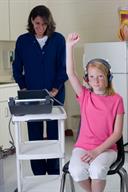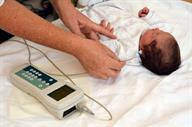ThisisPatientEngagementcontent
Hearing Tests, Pediatric
Learn more about our Patient Engagement products now! Turn your patients into active participants in their healthcare by giving them easy access to the same evidence-based information you trust – but delivered in an easy-to-understand format.
A hearing test is done to check for hearing loss in one or both ears. A hearing screening is a quick and easy test. If your child passes the screening, they do not have hearing loss. If the results show that there may be an issue, your child may need to see an expert in hearing loss (pediatric audiologist) to have more tests done.
Hearing loss can affect your child's ability to learn to speak and to reach other development goals. Knowing early about hearing loss can help your child's health care provider take steps to treat the issue.

There are many types of hearing tests. Hearing is measured in decibels (dB). The tests may be done when your child is a baby or when they are a little older.
Hearing tests for babies
Babies are often screened with:Hearing tests for older children
Your older child may also have:
Most babies get hearing screenings in the hospital before they go home after birth. Most children get hearing screenings at school and at checkups with a provider. Many hearing tests are done in a room with special equipment. Some tests are done in a loud place to see if your child can block out background noise. This includes speech tests.
For more testing, your child may need to see a pediatric audiologist. They will:This information is not intended to replace advice given to you by your health care provider. Make sure you discuss any questions you have with your health care provider.
Cookies are used by this site. To decline or learn more, visit our cookie notice.
Copyright © 2025 Elsevier, its licensors, and contributors. All rights are reserved, including those for text and data mining, AI training, and similar technologies.